高中英语必修1unit1schoollife整单元教学设计译林牛津版
牛津译林版高中英语必修一Unit 1《School Life》(Word power)教案

To strengthen tection, we can give the students more practice.
Ask the students to take out the maps they prepared before class. Let them discuss the map and put their maps into English first.
*Walk towards / past…, and then wa lk between…and…. You will find…at the end of the road.
Step 2.Read a map
After the warming up exercises, we will come to the topic of this period.
进行口语练习,在练习中掌握词汇
板书设计
(用案人完成)
当堂作业
完成口语任务和单词识记
课外作业
预习语法,并且完成课后作业
教学札记
Module 1 Unit 1 School life Word power
课题
M1U1 Word power
课型
新授课
教学目标
Enable the students to learn the words and expressions about school facilities.
Help t he students learn how to master the words and expressions about school facilities and equipment in the gym
【英语】牛津译林版高中英语必修一Unit1SchoolLifeword教案
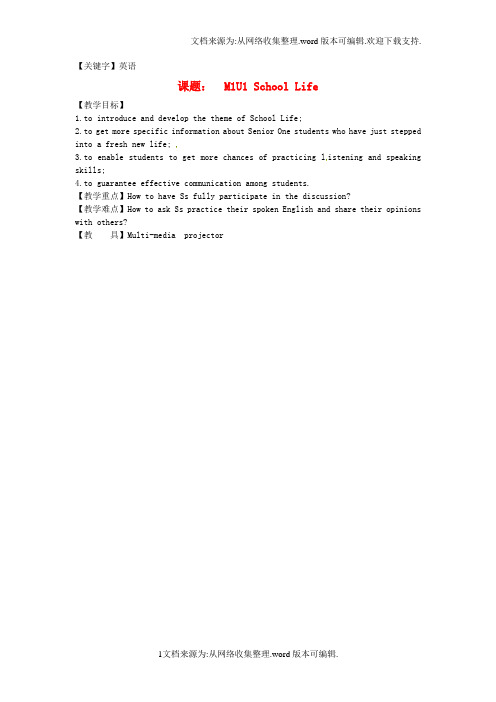
【关键字】英语课题: M1U1 School Life【教学目标】1.to introduce and develop the theme of School Life;2.to get more specific information about Senior One students who have just stepped into a fresh new life;3.to enable students to get more chances of practicing l istening and speaking skills;4.to guarantee effective communication among students.【教学重点】How to have Ss fully participate in the discussion?【教学难点】How to ask Ss practice their spoken English and share their opinions with others?【教具】Multi-media projector【教学过程】【二次备课】Step 1 Greeting and lead-inWelcome to our English class. I’m very glad to see you here.It’s the beginning of a new team you have just finished juniorschool and are about to enter a new period in your studies.In your opinion, what do you think of your school life?School life: excitement, challenges, success, laughter’s,tears, joys, sorrows, dreams, discoveries,failures.Step2welcome to the UnitT: High school is a time of discovery, learning and hard work.You should cherish the time and makeProgress every day. I can see you’re eager to know whatstudying at senior high will be like inChina?Is it different from other countries. Let’s compare them.In the British High SchoolIn the Chinese High School1.huge campus and low-rise buildinglarge campus and tall buidings2.locker for every studentnone has such equipment3. fewer students in each class 40-50-604. at ease with teachersbe friendly to each otherstep3 DiscussionT: Discuss the three questions on page1Can you dream of your school life? ( teacher? Students?Classmates?) what characteristics should theyhave?Teachers: fair, patient, learned, humorous, co-operative,energeticStudents: diligent, e nergetic, civilized, polite,competitive, co-operate, open-minded,strong-mindedT: very good. Teachers and students should cooperate with eachotherTeacher s hould love / learn from/ encourage/ understand/help/ respectT: only in this way. Can we make progress every day and achievesuccess. How can we achieve Success?(courage, belief, luck, diligence, perseverance,intelligence,confidence, competence,cooperation, wisdom, determination)T: like a scientist bent on making a discovery, we must cherishthe hope that one day we will rewarded.Some useful saying1.Life is a bumpy road.2.where there is a will, there is a way.3.Failure is the mother of success.Step4 Language points1.High school is a time of discovery, learning and hard work.抽象名词time, means, knowledge, collection, 在具体语境中,即后面有of短语或后接一个定语从句,前面要加不定冠词a/anThere was on ce a time when I hated to go to school.have a good knowledge of English 精通英语have a large collection of coins2.What are some differences between……?参考金榜直通P2补充:tell the difference between A and B= tell A from B 3.What is your dream school like?What is sth like? 某物是什么样的?What is sb like? 某人的(性格、外貌....)是什么样的?What does sb/ sth look like?某人(某物)看起来是什么样的?How is sth?某物的质量如何?How is sb?某人的身体怎样?补充:你觉得…..怎么样?How do you like/find ……?What do you think of ……?What do you like about ……?发散:like doing/ to do 喜欢做....Would ike to do 愿意做....feel like doing 想做.....Sound like 听起来像......【作业布置】【教学后记】此文档是由网络收集并进行重新排版整理.word可编辑版本!。
牛津译林版必修一Unit 1《School life》word教案
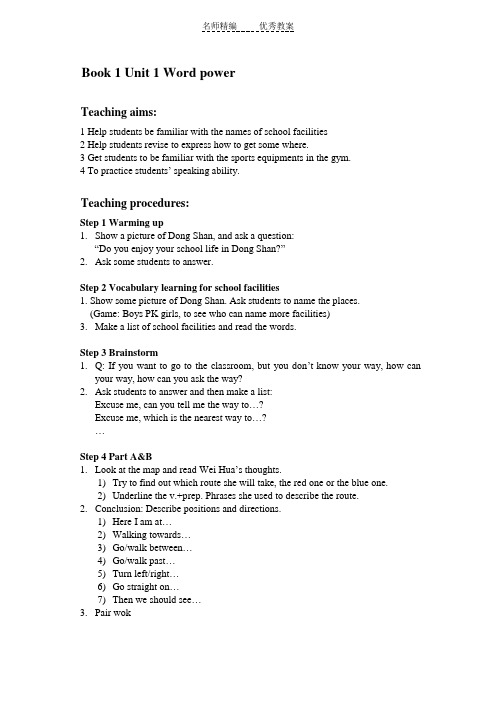
Book 1 Unit 1 Word powerTeaching aims:1 Help students be familiar with the names of school facilities2 Help students revise to express how to get some where.3 Get students to be familiar with the sports equipments in the gym.4 To practice students’ speaking ability.Teaching procedures:Step 1 Warming up1.Show a picture of Dong Shan, and ask a question:“Do you enjoy your school life in Dong Shan?”2.Ask some students to answer.Step 2 Vocabulary learning for school facilities1. Show some picture of Dong Shan. Ask students to name the places.(Game: Boys PK girls, to see who can name more facilities)3.Make a list of school facilities and read the words.Step 3 Brainstorm1.Q: If you want to go to the classroom, but you don’t know your way, how canyour way, how can you ask the way?2.Ask students to answer and then make a list:Excuse me, can you tell me the way to…?Excuse me, which is the nearest way to…?…Step 4 Part A&B1.Look at the map and read Wei Hua’s thoughts.1)Try to find out which route she will take, the red one or the blue one.2)Underline the v.+prep. Phrases she used to describe the route.2.Conclusion: Describe positions and directions.1)Here I am at…2)Walking towards…3)Go/walk between…4)Go/walk past…5)Turn left/right…6)Go straight on…7)Then we should see…3.Pair wokAsk students to read the guidelines of Part B, and finish the writing description of the quickest way to get from the dormitories to Classroom 4. Then get each of them to read their passage to their partner. And then ask some of them to read their passage to the whole class.Sample answers:(B) If you are standing at the door of the dormitories, first turn right and go past the medical centre and the gym, then turn left and walk until the end of the road. Classroom is on your left.4. Design some more samples for the students to practice. For example, ask students to mark the shortest way from the science laboratory to classrooms 16-25. This exercise encourages students to familiarize the phrases of finding the way. (If time doesn’t permit, this step can be left out.)5. Ask students to finish Part C individually, and then check the answers with the whole class.Answers:(C) 1 car park 2 classrooms 3 library 4 labs 5 gym 6 swimming pool 7 dormitories 8 medical centre 9 canteenStep 5 Vocabulary extension1. Lead in.Q: For all the school facilities, which one do you like best?Ss: …T: I liked to go the gym most, when I was in my university, I can do sports there and keep fit. There are many kinds of sports equipments in the gym.2. Show a picture of the gym.3. Ask students to read the guidelines of Part D. Then get them to look at the words under the picture and guess the meaning of each word. They can first write down the number of the words of which they know the meanings before these words. Then guide students to guess the meanings of the words they don’t know.Answers:(D) 4 beam 7 barbell 1 climbing bars 6 basketball court 2 rings 8 mat 3 dumb-bell 5 skipping rope2 Ask students to read the words that appear in this part and try to learn them by heart. Step 6 Discussion1.If we will build a new big gym in Dong Shan, what kinds of equipments or courtsshould be included in your opinion?2.Ask students to discussion the above topic in groups, and then ask some of themto show their results.Step 7 Homework1. Let the students to remember all the useful words and expressions in Part A, B, andD .2. Ask the students to make a map of Dong Shan Senior High School.名师精编优秀教案。
牛津译林版高中英语必修1Unit1SchoollifeReading教案4译林版必修1

科目English 年级班级时间课题Unit 1 School life Period 2 Reading Ⅰ教学目的Train the students’ reading ability.Learn some useful words and expressions.Learn more about school life in the UK and the differences between school life in the UK and in China教材分析Teaching Important & Difficult Points:Learn and master some important words, phrases and language points in this period.How to help the students improve their reading ability and understand the passage better.时序实施教学过程设计Step 1 Greetings1.Greet the whole class as usual.2.Check their home workStep 2 ReadingThe General Idea of This Period:This period is about the reading of the passage School Life in the UK. It will help you to learn more about school life in the UK and the differences between that in theUK and in China. Meanwhile you can learn some reading strategies such as skimming and scanning.T: Last time we learned about some differences between Chinese and British school life. Today we are going to read a passage by Wei Hua, who once studied in the UK. She will give us some detailed information about the school life in the UK.T: This is the first time to read a passage, so first let’sshare some reading strategies:Reading strategies: skimming and scanningSkimming: to get a general idea of the article.focus on the title, headlines, captions, the first and last sentences of paragraphs, charts and pictures …Scanning: to locate specific information about an article.Look for key words and phrases, dates and words in bold, italics or capital lettersWe do not need to read the whole text word by word.Skim the passageHow does Wei Hua feel about her life in the UK?Scan the letter What topics are mentioned in the Wei Hua’s letter?Are the following aspects of school life mentioned in the article?teachers classmates friends subjects homeworkT: Now let’s skim the text quickly and answer these questions. Hand up when you get the answers.1.How long did Wei Hua stay in Britain? For one year.2.What was the name of Wei Hua’s class teacher? Mr Heywood.3. What did Wei Hua make in her woodwork class? A small table.T: Now let’s readthe passage again carefully to check the answers. Underline new words in the text. Meanwhile, some more questions are waiting for you.(First go through the questions on P4 so that they know what to find out. Give them a chance to discuss with their partners if they want)1.What time do British Schools usually begin? 9 a.m2.What time do they usually end? 3:30p.m3.On average, how many students are there in a class in the UK?4.Why did Wei Hua find her homework difficult at the beginning of her study in theUK? Because all the homework was in English.5.On Tuesdays, what did Wei Hua do in evening?She had an extra French class on Tuesday evening6.What do British students usually eat after their main meal? Desserts.7.Which British city did Wei Hua go to? Manchester.Write down the new words the students have just listed.Do Part C on P4T: First some true or false questions. If it is false, please try to correct it.1.Wei Hua likes the school hours in the UK.2.Chinese schools encourage students to work hard.3.Wei Hua ‘s favorite teacher was Miss Burke.4.British students have fixed classroom and classmates.5.British students can only study two languages: English and French.6.British students eat a lot of fruit.7.Wei Hua enjoyed playing football.Detailed-readingCompare the similarities and differences of school life between China and the UK.Show the students a chart and help them finish it.The UK ChinaSchool hours 9a.m. to 3.30p.m. 8a.m.to 5.30p.mOn the first day Attend assembly and know the rules o theschool from the headmaster.The sameteachers Kind, helpful, and get on well with thestudents. Most teachers have a good relationship with the students.Homework Not so heavy but a little challenging A little heavy.subjects English, History, Computer Science,Maths, Cooking,etc; some extra classes Chinese, Maths, English, Art, Computer Science and so onOthers (food, activities)Step 3 Listening and ConsolidationT: Now Let’s listen to the tape. You may follow it while listening, and pl easepay attention to your pronunciation.(The teacher plays the tape for the students to listen. After that the teacher givesthe students a few minutes to read aloud the passage. Meanwhile, the teacherasks the students to try to remember some details.)T: Please turn to Page 5.Let’s do Exercise E.Step 4 DiscussionT: Now you’ve known much about Wei Hua’s school life in the UK. From the text we know that they have a variety of subjects to choose from. You may be quitepuzzled whether it is necessary for senior students to learn some of them, suchas so many languages and woodwork. Here let’s have a discussion: Should students learn more languages? Why or why not?What subjects would you like to take if you could choose? Why?T: Use the conversation below as an example:A: What subjects do you like best and least?B:I really enjoy Woodwork and Art classes, because I like making things, butI ‘m not very good at History.A:I like English and Chinese best. Do you think we should learn more foreignlanguages?Perhaps we should learn….Step5 Summary and HomeworkT: Today we’ve learned a text about Wei Hua’s experience in the UK.First we learned some reading strategies: skimming and scanning. Master these and putthem into use in future while reading. Through reading we know there are manydifferences both in the timetable and in the curriculum. Read the passage afterclass and get familiar with these language points. Have a further discussion withyour partners about the topic in Part F.教学后记。
牛津译林版高中英语必修一Unit 1《School Life》(Task)教案
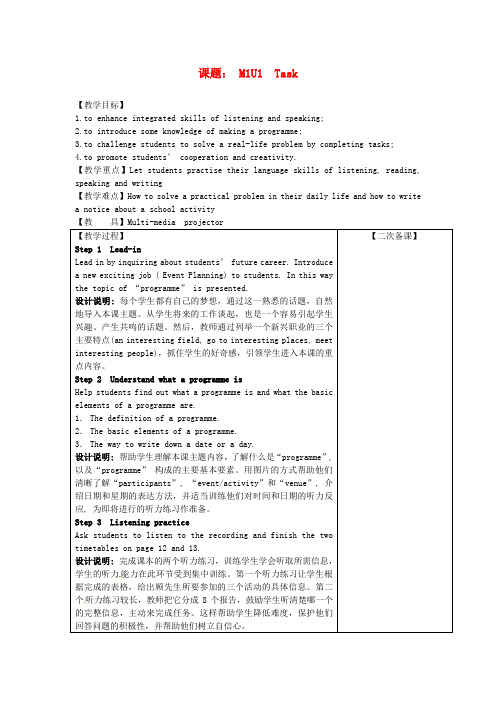
space空间,空白(多为不可数,有时与不定冠词连用); room空间、地方;只作不可数名词
9.When comparing,you must read all the information carefully before you make any decisions ( p14 )作比较时,你必须先认真阅读所有信息然后再做出决定。
Step 2 Understand what a programme is
Help students find out what a programme is and what the basic elements of a programme are.
1.The definition of a programme.
1.Ask students to read and understand what sun is going to be involved in next week.
2.Get them to work in groups and offer help if they meet with some translation problems.
comparev.比较
Compar see the difference.
Compared with man y people,she was indeed luck.
【二次备课】
【作业布置】
【教学后记】
2.The basic elements of a programme.
3.The way to write down a date or a day.
设计说明:帮助学生理解本课主题内容,了解什么是“programme”,以及“programme”构成的主要基本要素。用图片的方式帮助他们清晰了解“participants”,“event/activity”和“venue”,介绍日期和星期的表达方法,并适当训练他们对时间和日期的听力反应,为即将进行的听力练习作准备。
Unit1SchoolLife(译林牛津版高一英语必修一教案教学设计)

Unit1SchoolLife(译林牛津版高一英语必修一教案教学设计)Textual Analysis:This unit introduces and develops the theme of school life.(1) In Welcome to the unit, students are presented with four different aspects of school life in the UK and are asked to compare the differences between high schools in the UK and in China. The reading text School life in the UK deals with an article from a school magazine on school life in the UK.(2) Word power talks about school facilities;(3) In grammar and usage, students are required to learn the Attributive Clause--- the usages of “that, which, who, whose, whom”.(4) Task deals with reporting school activities. In the Project section, students will learn how to design a poster.Teaching aims:Encourage the Ss to learn the following(1) Vocabulary: words and phrases(2) Grammar: the Attributive Clause--- the usages of “that, which, who, whose, whom”(3) Skills of reading a magazine(4) Culture: school life; school activities; after-school activities; schoolclubsImportant points & difficult points:The Attributive Clause; Making a projectTeaching aids:computer; tape-recorderInteractive patterns:teacher-class; pairs; groupsTeaching methods:Audio-visual method; Direct method; Functional approach Teaching process:Welcome to the Unit: (0.5 period)(1) Warming up questions(2) Talk about the pictures(3) More questionsReading: (1.5 periods)(1) Lead-in(2) First reading(3) Further reading(4) Text Check(5) Notes/language points(6) ExercisesGrammar (task-teaching method) (2 periods)(1) explanation(2) exercisesWord power (1.5 periods)(1) text learning(2) more exercisesProject (1.5periods)(1) text learning(2) more practiceSelf-assessment (1 period)/Test (1 period)Periods:Welcome to the Unit: (0.5 period)(1) Warming up questionsa. What school were you at last term?b. Why did you choose our senior high school?c. Are there any differences?(2) Talk about the picturesa. Huge campus and low-rise buildingsb. Lockers for every studentc. Fewer students in each classd. At ease with our teacher(3) More questionsa. Do you know of any other differences between the lives of Chinese and British high school students?b. What kind of school activities do you enjoy?c. What is your dream school life like?预习专练I.请根据句意填写适当的单词1. Going to a foreign high school for some time is very ________(开心) and exciting.2. Almost no high school students are ___________ (满意)with the school hours in China.3. I know from my own ____________(经历) how difficult this kind of work can be.4. I felt lucky as all my teachers were very ___________ (有助)and I enjoyed all my subjects.5. Sometimes I played football with the boys. Sometimes I just ________ (放松)under a tree or sat on the grass.6. George Bush was invited to a__________ the APEC held in Shanghai.7. My English i_________ a lot as I used English every day and spent an hour each day reading English books in the library.8. The paintings that David d__________ to the school are being displayed in the assembly hall.9. Though it didn’t look l________ a table when it was finished, I still liked it very much.10. British people eat lots of desserts after their m_________ meal.Reading: (1.5 periods)(1)Lead-inHow long did Wei Hua stay in Britain?What was the name of Wei Hua’s class teacher?What did Wei Hua make in her Woodwork class?(2) First readingExercises: (P4)C1/C2(3) Further readingMake an interview.S1-S2(Wei Hua)Write an article about the differences between high schools in the UK and in China.(4) Text CheckGoing to ____ British high school for one year was ____ very enjoyable and exciting experience for me. I was very happy ______the school hours in Britain because school ______ around 9 a.m. and ends about 3.30p.m. This means I could get up an hour later ________ as schools in China begin before 8 a.m. On the first day, all students went to attend _______ assembly. I sat _______ a girl _______ name was Daniel.We soon became best ______. The best way ______ ____respect from the school was ______ hard and achieve high grades. This sounded ______ my school in China. I _____ many teachers in the past year and they each taught only one ________. Miss Burke was the teacher ______ taught us English literature. This is about the ________ size for British schools. We had to _______ different classrooms _____ different classes. I found the homework was not as _____ as ____I used to get in my oldschool, but it was a little ________ for me at first because all my homework was ____ English. I felt lucky as all my teachers were _________ and I enjoyed all my subjects. My English _______ a lot as I used English every day and spent an hour each day _____ English books in the library. I usually e-mailed my family and friends back home _____ at lunchtime. I also had an _____ French class ____ Tuesday evenings. Cooking was really ___ great fun as I learned how to buy, prepare and cook food. At the end of the term we ____ a class party and we all had to cook something.(5) Notes/language points重点词汇解析attend v. 参加原句在线:__________________________________________________________________ According to the law in China, all children between 6 and 14 must attend school. 根据中国法律,六到十四岁的儿童必须上学。
牛津译林版高中英语必修一《Unit 1 School life》 Grammar 教学设计
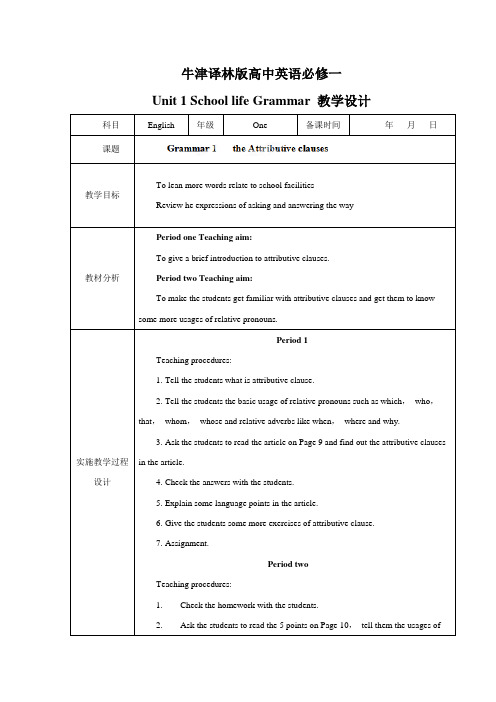
牛津译林版高中英语必修一Unit 1 School life Grammar 教学设计科目English 年级One 备课时间年月日课题教学目标To lean more words relate to school facilitiesReview he expressions of asking and answering the way教材分析Period one Teaching aim:To give a brief introduction to attributive clauses.Period two Teaching aim:To make the students get familiar with attributive clauses and get them to know some more usages of relative pronouns.实施教学过程设计Period 1Teaching procedures:1. Tell the students what is attributive clause.2. Tell the students the basic usage of relative pronouns such as which,who,that,whom,whose and relative adverbs like when,where and why.3. Ask the students to read the article on Page 9 and find out the attributive clauses in the article.4. Check the answers with the students.5. Explain some language points in the article.6. Give the students some more exercises of attributive clause.7. Assignment.Period twoTeaching procedures:1. Check the homework with the students.2. Ask the students to read the 5 points on Page 10,tell them the usages of。
牛津译林版高中英语必修一Unit 1《School Life》(Reading)教案

教学目标
Train the students’reading ability.
Learn more about school life in theUKand the differences between school life in theUKand inChina
重点
Help the students to understand the passage better.
Learn and master some important words and phrases in this period.
难点
How to help the Students improve their reading ability and understand the passage better.
3. From my point of view, most foreign teachers are humorous and kind-hearted. It seems that they have a close relationship with their students. And some of our teachers are too strict with us. Maybe not only the students, but also the teachers are under the pressure of the entrance examination.
2. What impressed me a lot are the lockers in the classrooms for students to put their stationery, books, exercise books and other belongings . I think it is really convenient for the students. While inChina, we usually have a heavy burden of school bags. I often wonder if the heavy bags will do harm to the development of our bodies.
英语:unit1《school life》教案(译林牛津版必修1)
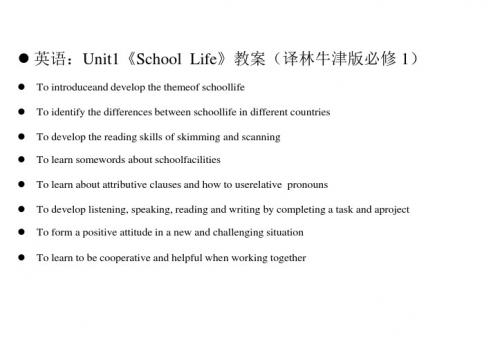
2. 3. 4. 5. 6. 7.
Skimming Scanning Detailed reading Thoughts after reading Group work (problem solving) Introducing moreinformation
英语:Unit1《School Life》教案(译林牛津版必修 1)
To introduceand develop the themeof schoollife To identify the differences between schoollife in different countries To develop the reading skills of skimming and scanning To learn somewords about schoolfacilities To learn about attributive clauses and how to userelative pronouns To develop listening, speaking, reading and writing by completing a task and aproject To form a positive attitude in a new and challenging situation To learn to be cooperative and helpful when working together
To know about schoollife in the UK
To compareschoollife in the UK and in China To form a positive attitude in a new and challenging situation
牛津译林版必修一Unit1《SchoolLife》word教案(2)

英语:Unit1《School Life》教案(2)(译林牛津版必修1)一. 教学内容:Unit 1 School life二. 教学目标:掌握Unit 1语法定语从句三. 教学重难点:掌握定语从句(一)the handsomethe tallthe strong boythe cleverthe naughtyThe boy is Tom.将两部分内容连接起来The boy who is handsome is Tom.The boy who is tall is Tom.The boy who is strong is Tom.The boy who is clever is Tom.The boy who is naughty is Tom.1. 概念:在复合句中,修饰某一名词或代词的从句叫定语从句。
The girl who is standing there is Mary.先行词关系词2. 先行词:被定语从句所修饰的词。
3. 关系词:引导定语从句的词。
关系词:在句子中充当成分例:不到长城非好汉。
He who hasn’t been to the Great Wall is not a true man.谁笑在最后,谁笑得最好。
He who laughs last laughs best .天助自助者。
God helps those who help themselves.Who is Tom?The boy is Tom. The boy is smiling.The boy who is smiling is Tom.The boy is Tom. The boy has a round face.The boy who has a round face is Tom.The boy is Tom. The boy sits in front of me.The boy who sits in front of me is Tom.将下面两个句子连成一个句子,形成定语从句。
译林牛津版高一英语必修一unit1schoollife教案
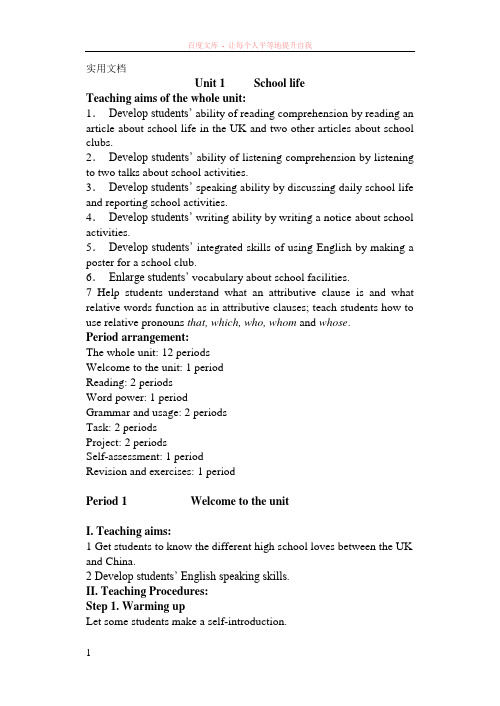
Unit 1 School lifeTeaching aims of the whole unit:1.Develop students’ ability of reading comprehension by reading an article about school life in the UK and two other articles about school clubs.2.Develop students’ ability of listening comprehension by listening to two talks about school activities.3.Develop students’ speaking ability by discussing daily school life and reporting school activities.4.Develop students’ writing ability by writing a notice about school activities.5.Develop students’ integrated skills of using English by making a poster for a school club.6.Enlarge students’ vocabulary about school facilities.7 Help students understand what an attributive clause is and what relative words function as in attributive clauses; teach students how to use relative pronouns that, which, who, whom and whose.Period arrangement:The whole unit: 12 periodsWelcome to the unit: 1 periodReading: 2 periodsWord power: 1 periodGrammar and usage: 2 periodsTask: 2 periodsProject: 2 periodsSelf-assessment: 1 periodRevision and exercises: 1 periodPeriod 1 Welcome to the unitI. Teaching aims:1 Get students to know the different high school loves between the UK and China.2 Develop students’ English speaking skills.II. Teaching Procedures:Step 1. Warming upLet some students make a self-introduction.1. Introduce themselves.2. Say something about their junior high school life.3. Pair work: brain storm:When we are talking about our school life, what will we probably think of?What words or phrases will we use to describe our school life? Step 2 Presentation1.Say the following to students:It’s the beginni ng of the new term. You’ve just finished your junior high and are about to enter a new period in your studies. I am happy to give your lessons and I hope we can be friends.I can see that some of your are eager to know what studying at senior high will be like. Will it be differ4ent from junior high? Well, there are certainly many differences between junior high and senior high, but there are also some things that are the same in every school in China. What about schools in other countries? Do you have different experiences? Are schools all over the world the same? This is the subject of our first unit.2. Ask students to read the instruction and tell them:Here are three pictures that show some aspects of school life in the UK. Please read the instructions, look at the pictures: what's the difference between schools in China and the UK?Step 3 Discussion1 Ask students the following questions to talk about the words in the four pictures:Huge campus and low-rise buildingsWhat does huge mean?What does low-rise mean?What about campus and school buildings in China?(Schools in China usually have a large enough campus to make sure students have enough space to study and play. But most school buildings have at least 3 storeys.)Lockers for every studentDo you know what a locker is?(There are rows of lockers by the classrooms for students to put their bookd, exercise-books and other belongings.)What do you think about locker for students?Do you think that we should have such locker in our school? Why or Why not?Fewer students in each classHow many students are there in our class?Do you know the number of students in a class in the UK?At ease with our teacherWhat can we know from this picture?What does the word ease mean? What do you think the phrase at ease mean?Were you getting on well with the teacher when you were in junior high?What relationship do you want to have with your teachers in senior high?2 Ask students to work in groups to talk about the four pictures and the differences between schools in the UK and China. Then ask several students to report their discussion to the whole class.aspects In the UK In ChinaHuge campus and low-rise buildings We can see hugecampus andlow-rise buildings.It is the biggestdifference fromschools in ChinaSchools in China usually have alarge enough campus to make surestudents have enough space tostudy and play in.But most school buildings aretaller, at least three storeys.Lockers for every student There are rows oflockers by theclassrooms forstudents to put theirstationary, books,exercise-books andother belongings.Students bring what they need forlessons to school and then take itall back home after school. Mostschools in china do not haveequipment in the classroom.Fewer students in each class There are fewerstudents in a class,no more than 30 perThere are usually more students inhigh school, perhaps 40 to 50 perclass. Recently some schools areclass. beginning to limit the number ofstudents in each class.At ease with our teacher Students have aclose relationshipwith their teachers.They feel at easeand comfortablewith them.It is similar in china. Nowadays,lots of teachers and students haveestablished a good relationshipwith each other. They respect eachother and work to gain a betterunderstanding of each other.3. Ask students to discuss the three questions in pairs, and them ask some of them to report their answers to the questions to the whole class.What is your dream school life like?What kind of school activities do you enjoy?What do you think of your life here in the new school?Step 4 Summary and HomeworkToday we’ve mainly talked about the differences between the high school lives in the UK and in China. After class you should:1) Recall all the new words and expressions that we learn in this lesson.2) Find more about any other differences between the high school lives in the UK and in China, either by surf the Internet or by reading some articles in newspapers or magazines.3) Preview the following part: reading (page 2 to page 4).Period 2 Reading (1) School life in the UKTeaching aims:1. Get students to know what school life is like in a high school in the UK.2. Develop students’ ability of reading comprehension through:1)skimming and scanning.2)Guessing the meanings of some new words from the context3. To learn some expressions about school life.Teaching procedures:Step 1 Lead-in and PresentationSay the following to the students:Yesterday we’ve talked about the differences between the high school lives in the UK and in China. We know well about the high school lives in China, because we are Chinese. But we know a little about the high school lives in the UK. Yeah? Today we are going to read a magazine article which is written by an exchanging student. She has been studying in the UK for one year. Now she gives a clear brief introduction about her school life there.(Bb: School life in the UK) Before we read the article, we are going to learn the reading strategy: skimming and scanning.Please look at page 3: Reading strategy. (Bb the following while learning the reading strategy. )Skimming: to get a general idea of the article, without studying it in detail.Focus on the titles, headings, the first and last sentences or paragraphs, charts and pictures …scanning: to find certain information in an article quickly.Look for key words and phrases, dates and numbers, etc.Step 2. Reading1. Skimming:Question: How does Wei Hua feel about her life in the UK?2. Scanning:1)Ask students to go through the three questions in part A and makesure that each of them know the meaning of each question.(AWoodwork class is a class in which students make somethingfrom wood.)Ask students to read the passage as quickly as possible and try to find answers to the three questions. Remind students only tofocus on and identify the most important information.2)Ask student to reread the passage and complete Part C1individually. Then ask some of them to give the answers to thequestions in Part C13)Ask students to finish Part C2 individually. Then get somestudents to share their answers with the whole class. Ask them to say the true sentences to correct the false ones.3 GuessingAsk students to finish Part D individually. Tell them not to look up the meanings of the words from the wordlists in the textbook. Let themguess the meanings from the context. Then check the answers with the whole class.Step 3 New Words in this UnitStudy the new words appears from page2 to page 5 (from attend to immediately) at page 68.Step 4. Homework.1. Complete part E on page 5.2. Read the two articles in reading on pages 82 and 83 in wb and answers the questions below them.3. Learn all the new words we learned today by heart.Period 3 Reading (2) School life in the UKTeaching aims:1 Help students become more familiar with the article.2 Develop students’ ability of reading comprehension by finding out what topics are covered in the article.3 Develop students’ ability of speaking by discussing the subjects they like in school.Teaching Procedures:Step 1. Revision:Check the homework:1)Have a dictation to go over the words learned last period.2)Check the answers in reading on pages 82 and 83 in wb.3)Ask some students to read the article in Part E to check whetherthey have used the suitable word in each blank.Step 2 Reading1) Ask some students to read the article aloud paragraph by paragraph. Ask other students to find out what topics are covered in it.School hoursSchool assemblyTeachersClass sizeDifferent classes in different classroomsHomeworkSubjects and favourite subjectsWhat to do at lunchtimeBritish food3)Ask students to point out the different high school lives in the UKand in China in these topics.Step 3 DiscussionLet students look at Part F together and discuss the questions in Part F in Pairs. Then get some pairs to act out their discussion in class.Step 4 Language focus1 Ask students to find out the following words, phrases and sentences in the article. Then give some explanations.Words:a)as (since, because, for)b)attend (join, join in, take part in)c)prepared)experiencee)respectf)exciting, excitedg)dropPhrases:a)for freeb)be happy withc)used to do sth.; be/get used to do sth.; be/get used to doing sth.d)the way to do; the way of doing; the way + Attributive Clausee)at the end of; in the end; by the end off)as … asSentences:a)Going to a British school for one year has been a very enjoyableand exciting experience for me.b)I do like eating.c)We also had different students in some class, so it was difficult toremember all the faces and names.2 Ask students to put the following sentences into English in their exercise-books.1) Jim 加入了我们的讨论之列。
牛津译林版英语高一上册Module1《Unit1Schoollife》word教案
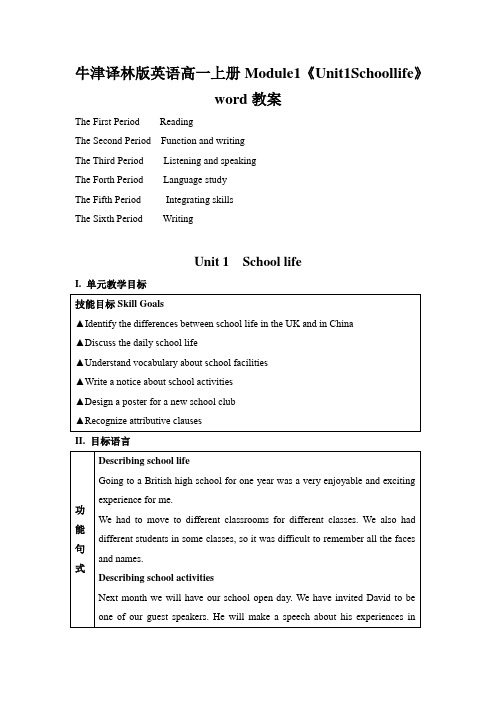
牛津译林版英语高一上册Module1《Unit1Schoollife》word教案The First Period ReadingThe Second Period Function and writingThe Third Period Listening and speakingThe Forth Period Language studyThe Fifth Period Integrating skillsThe Sixth Period WritingUnit 1 School lifeI. 单元教学目标II. 目标语言Ⅲ. 教材分析与教材重组1. 教材分析本单元以School life为话题,旨在通过单元教学使学生了解英国校园生活的一些差不多情形及中英两国校园生活的不同之处;学习并能运用表示校园设施的一些差不多词汇;学习定语从句的差不多概念及关系代词的用法;能就校园活动的话题展开讨论;能就校园活动情形向班任老师做出报告;学习通知的写法;学会设计以介绍学校俱乐部为主题的海报等。
1.1 Welcome to the unit 部分利用四幅图片,分别从(校园风貌、生活设施、课堂教学、师生关系)四个不同的侧面介绍了英国校园生活的有关情形。
该部分还设计了三个讨论话题,引导学生对中英两国校园生活进行比较,并就相关话题发表自己的看法。
1.2 Reading部分的短文节选自一份校园杂志。
文章由一位交换留学生所写。
作者通过自己的亲身经历简要地介绍了英国学校生活的一些情形。
文章前后分别设计了五个部分的练习:前两个练习(A、B)要求学生运用本单元介绍的两种差不多阅读方法(skimming and scanning)阅读文章,把握文章主旨大意,了解文中明显的细节内容;练习C1通过问题的形式考查学生对文中具体信息的把握程度;C2通过判定正误练习加深学生对阅读材料的明白得;D部分为词汇练习,要求学生第一联系上下文推测所给词汇的含义;然后通过配对练习关心学生把握新词的含义和用法;E部分要求学生通过运用所给词汇填空的方式完成一封英国学生写给Wei Hua的信件,以进一步加深学生对阅读内容的明白得;练习F设计了两个话题,引导学生对校园生活有关话题展开讨论,以获得对文章深层次的明白得。
新牛津译林版高中英语必修一unit 1《school life》school life in the uk优秀教案(重点资料).doc
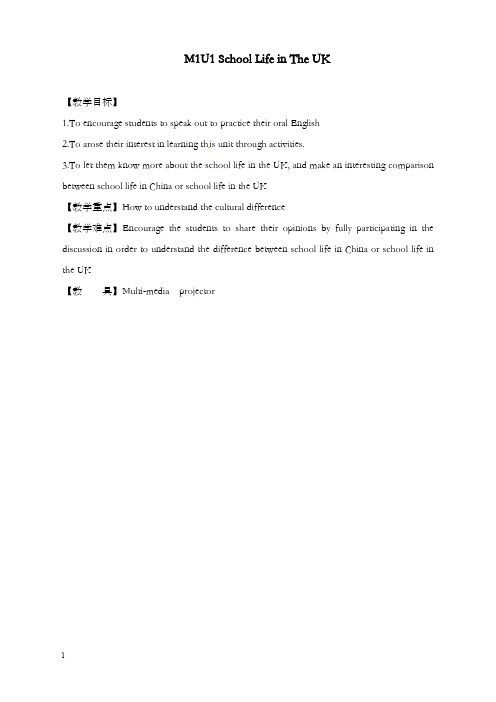
本句里的Going是动名词,它和后面的to a British high school for one year构成动名词短语作句子的主语。Go to a British high school本来是个动词词组,在go后面加上ing后,它就具备名词的特性可以在句子中充当主语、宾语或表语。
Find out the main idea of each paragraph and answer questions concerning the content of each paragraph.
Part1:
School hours:
1. Was she happy with the school hours? ______________
My(7)_______ teacher taught us English Literature.
Homework was not as (8)_______as what I used to get in my
old school.
My English (9)______a lot as I used English everyday and
be happy with对……很满意,相当于be pleased with
I'm pleased with his new house.
▲拓展:be happy to do sth乐于做某事
I shall be happy to accept your invitation.
3.This means I could get up a n hour later than usual as schools in China begin before 8 a.m.
高一英语Unit1《Schoollife》教案牛津译林版

牛津高中英语模块一(第1讲)【教学内容与教学要求】一、教学内容:牛津高中英语模块一Unit 1 (上)二、教学要求:1.掌握和校园生活有关的常用单词、词组与句型。
2.学会描述校园生活和学校设施。
High school is a time of discovery, learning and hard work!高中是探索、学习和辛勤劳动的时期Huge campus and low-rise building 学校面积大,没有高层建筑。
Twelve laboratories are available for different 个实验室可供不同试验使用。
Each room comes with its own bothroom and Internet access.每个房间都有自己的卫生间和英特网接口。
3.学习阅读技巧:skimming&scanning。
4.语法:定语从句(一)【知识重点与学习难点】一、重要单词:access achieve attend assembly article available average canteen club challenging context donate display experience extra graduate gym heading locker low-rise literature poster relax二、重点词组:class teacher 班主任 at ease with 和….相处不拘束 school hours学校作息时间 earn respect from 赢得…的尊敬 sound like听起来象 for free 免费 get a general idea 了解大意 as well as 除….以外, 也 key words 关键词 word by word 逐字逐句地 find one’s way around 认识路 develop an interest in 培养对….的兴趣 surf the Internet网上冲浪【难点讲解】1.What is your dream school life like?你理想中的学校生活是什么样子?这里dream表示心目中最理想的. 如 dream team (梦之队)。
江苏省连云港高级中学译林牛津版高中英语必修一教案:unit1schoollifetask
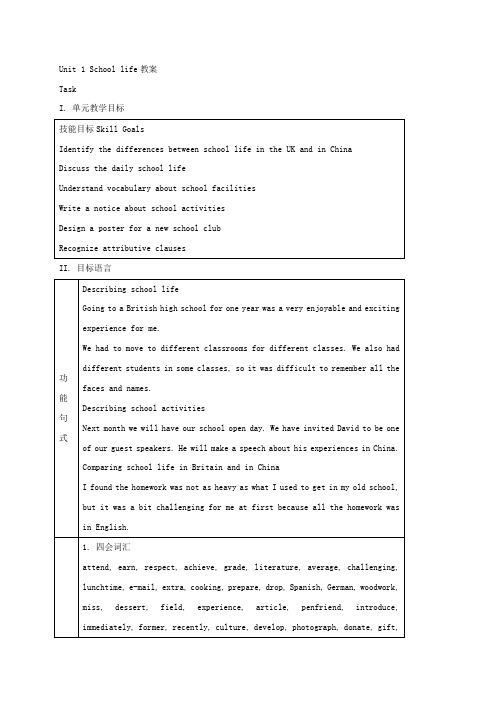
Unit 1 School life教案TaskI. 单元教学目标技能目标Skill GoalsIdentify the differences between school life in the UK and in China Discuss the daily school lifeUnderstand vocabulary about school facilitiesWrite a notice about school activitiesDesign a poster for a new school clubRecognize attributive clausesII. 目标语言功能句式Describing school lifeGoing to a British high school for one year was a very enjoyable and exciting experience for me.We had to move to different classrooms for different classes. We also had different students in some classes, so it was difficult to remember all the faces and names.Describing school activitiesNext month we will have our school open day. We have invited David to be one of our guest speakers. He will make a speech about his experiences in China. Comparing school life in Britain and in ChinaI found the homework was not as heavy as what I used to get in my old school, but it was a bit challenging for me at first because all the homework was in English.1. 四会词汇attend, earn, respect, achieve, grade, literature, average, challenging, lunchtime, e-mail, extra, cooking, prepare, drop, Spanish, German, woodwork, miss, dessert, field, experience, article, penfriend, introduce, immediately, former, recently, culture, develop, photograph, donate, gift,词汇display, kindness, guest, speech, flat, bookcase, attention, please, title, dynasty, cover, recent, professor, regret, inform, run, host, approve, broadcast, preparation, close, outing, continue,poet, generation, poem, select, require, scary, nature2. 认读词汇assembly3. 短语for free, pay attention to语法Introduction to attributive clausesRelative pronouns: that, which, who, whom, and whose重点句子1. I sat next to a girl whose name was Diane. P22. David was one of the most helpful studentsthat we ever had. P93. In 1998, he went to Oxford University where he got interested in Chinese culture. P94. Some of the cities in China which he likes most are Beijing, Shanghai, Harbin and Nanjing. P95. Most of the students that he taught have become his friends. P96. Some of the books were gifts that he got from his Chinese friends and students. P97. The paintings that David donated to the school are being displayed in the assembly hall. P98. During exam time we have a special programme that tells students the things they should or shouldn’t do for preparation. P18Ⅲ.教材分析与教材重组1. 教材分析本单元以School life为话题,旨在通过单元教学使学生了解英国校园生活的一些基本情况及中英两国校园生活的不同之处;学习并能运用表示校园设施的一些基本词汇;学习定语从句的基本概念及关系代词的用法;能就校园活动的话题展开讨论;能就校园活动情况向班任老师做出报告;学习通知的写法;学会设计以介绍学校俱乐部为主题的海报等。
牛津译林版高中英语必修一《Unit 1 School life》 Welcome to the unit 教学设计1

牛津译林版高中英语必修一Unit 1 Section ⅠWelcome to the unit 教学设计1.How many hours of sleep a day do the teenagers need on average?2.Why do students perform badly in the test in the early morning?现在,许多国家的中学生都患有“睡眠缺乏症”,美国也不例外。
不过,在美国越来越多的中学已经考虑推迟上课时间,让缺乏睡眠的孩子们多睡一会。
When Klyce's alarm clock sounds at 5:45 a.m.,the 17-year-old rolls over and turns it off. Without the second alarm clock that goes off at 6,she might have a much harder time getting to Kennedy High School in Fremont,Calif for the 7:35 a.m. first bell. When she's running late,she goes without breakfast and doesn't do her hair.Research shows that when teens hit puberty (青春期),they need 9 hours of sleep a day on average. Now a growing number of schools are pushing back the morning bell so class time and students' energy are better balanced.“The good side is,students are more awake,” says principal (校长) Amy McNamara of Logan High in New Haven Unified,which pushed back its morning bell to 8:40 in 2007. But a few parents complain that sports and extra courses can go into dinnertime,and in winter,into the dark. “That is a worry,” she says.“It's not perfect,but you can't please everybody.”It sounds clear: students don't test well early in the morning. In one Illinois study,every high school senior performed better when tests were given in the afternoon than in the morning. But most important tests,like the SA T,start at 8 a.m.“Their brains just aren't awake then,” said Sullivan,a children sleep specialist at Stanford Sleep Medicine Center. “Young people are in great need of sleep.”Teens don't necessarily stay up later when school starts later. In studies in Kentucky and Minnesota,when schools pushed the bell by an hour,high school students slept an extra 30 minutes per night.More sleep means fewer sleepy drivers,suggests another study. Car accidents dropped by 16.5% among students in a Kansas county after schools there moved their start time forward by one hour.1.How do you feel about your new life here in the first two days?参考答案:I feel so good in my new school. The school is beautiful. Myclassmates are very friendly. And all the teachers are kind...2.Look at the pictures and learn about the Chinese and British high schools.(1)(2)(3)答案:(1) low-rise(2)Fewer(3)outdoorScan the text and choose the best answer.1.What did the new students do on the first day?A.They attended an assembly.B.They listened to a lecture given by the headmaster.C.They got the information about the best way for them to earn respect from the school. D.They did some cleaning.答案:ASection ⅠWelcome to the unit & Reading — Pre-readingUnit 1School life2.It was hard for Wei Hua to remember all her classmates because ________.A.there were too many students in a classroomB.she didn't know EnglishC.she had to move to different classrooms for different classes and they had different students in some classesD.she had no friends答案:C3.From the passage we can see students in the UK can choose their subjects according to________.A.their parents B.their teachersC.their interests D.their ages答案:C4.The main idea of the passage is that________.A.her English improved a lot as she used English every dayB.school life in the UK is busy and bitterC.she had a wonderful experience in a British schoolD.she was happy with the British school hours答案:C5.We can infer from the passage that________.A.Wei Hua didn't like the way of life thereB.Wei Hua had a good time in the UKC.Wei Hua liked eating dessert at the end of the main mealD.Wei Hua didn't like History and French答案:BⅠ.Read the text again and decide whether the following statements are true (T) or false (F).1.Wei Hua liked the school hours in the UK.(T)2.British students always have the same classrooms and classmates.(F)3.British students can only study two languages: English and French.(F) 4.Not all the teachers encouraged Wei Hua to study hard.(F)5.Wei Hua went to the library every day to read English books in the UK.(T) Ⅱ.Read the text carefully and fill in the form.School life in the UKFill in the blanks according to the text.Wei Hua has been in a British high school for one year. In her class, there were only 28 students, which is about the 1.average size for British schools. But it was a 2.struggle for her to remember all the faces and names because they had to move to different classes for different lessons and also had different students in some classes. During her study, her teachers gave her much 3.encouragement,_so she found her life there 4.enjoyable and exciting. She enjoyed all her subjects, because the headmaster once said that the best way to earn respect was to 5.devote themselves to study and achieve high grades. She used English every day and her English 6.improved a lot. She found cooking was really 7.fun and she even made a small 8.sculpture in the Art class. During the lunch break, she could go to the Computer Club to send e-mails to her family and friends for free. After lunch, she usually played on the school field. She felt very 9.lucky to 10.experience this different way of life.Do you like to study in a high school of the UK? If you have the chance, how are you going to spend your school life there?参考答案:Yes, I do. First of all, I'll have to improve my English because all he subjects are written in English and teachers give their lessons in English, too. Secondly, I'll try my best to enrich my knowledge by learning all the other subjects well. Thirdly, I'll try to broaden my horizon by taking part in outdoor activities. Lastly, I'll build up my body and get along well with my classmates and teachers.。
牛津译林版高中英语必修一Unit 1《School Life》(Project)教案
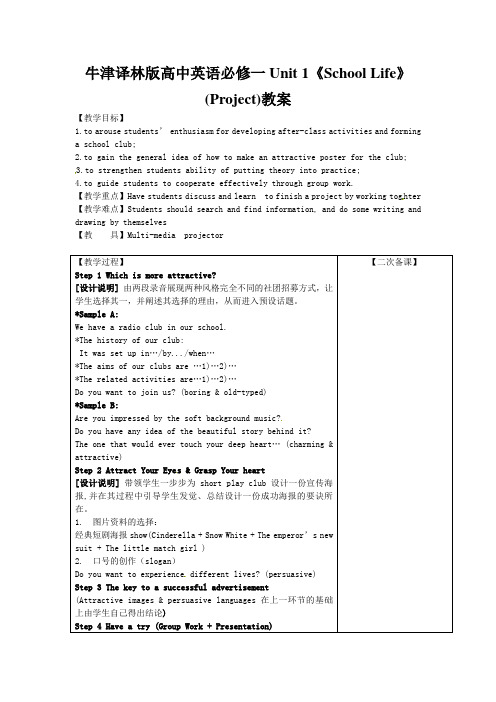
牛津译林版高中英语必修一Unit 1《School Life》(Project)教案【教学目标】1.to arouse students’enthusiasm for developing after-class activities and forminga school club;2.to gain the general idea of how to make an attractive poster for the club;3.to strengthen students ability of putting theory into practice;4.to guide students to cooperate effectively through group work.【教学重点】Have students discuss and learn to finish a project by working tog hter 【教学难点】Students should search and find information, and do some writing and drawing by themselves【教具】Multi-media projector【二次备课】【教学过程】Step 1 Which is more attractive?[设计说明] 由两段录音展现两种风格完全不同的社团招募方式,让学生选择其一,并阐述其选择的理由,从而进入预设话题。
*Sample A:We have a radio club in our school.*The history of our club:It was set up in…/by.../when…*The aims of our clubs are …1)…2)…*The related activities are…1)…2)…Do you want to join us? (boring & old-typed)*Sample B:Are you impressed by the soft background music?Do you have any idea of the beautiful story behind it?The one that would ever touch your deep heart… (charming &attractive)Step 2 Attract Your Eyes & Grasp Your heart[设计说明]带领学生一步步为short play club 设计一份宣传海报,并在其过程中引导学生发觉、总结设计一份成功海报的要诀所在。
- 1、下载文档前请自行甄别文档内容的完整性,平台不提供额外的编辑、内容补充、找答案等附加服务。
- 2、"仅部分预览"的文档,不可在线预览部分如存在完整性等问题,可反馈申请退款(可完整预览的文档不适用该条件!)。
- 3、如文档侵犯您的权益,请联系客服反馈,我们会尽快为您处理(人工客服工作时间:9:00-18:30)。
Period one Welcome to the unit
I. Teaching aims: l. To find out the differences of their life between senior high and junior high. 2. To learn something about thehigh schoollife in the UK. 3. To know how to get on well with high schoollife / study. 4. To find out how an activity attracts thestudents and helps the students II. Teaching Procedures: Step 1 Greetings Step 2. Warming up and Lead-in 1. Let somestudents makea self-introduction.
each class.
At ease with our Students have a close It is similar in china. Nowadays, lots of teachers and
teacher
relationship with their students have established a good relationship with teachers. They feel at each other. They respect each other and work to ease and comfortable gain abetter understanding of each other. with them.
2. Say something about their junior high schoollife. Step 3. Presentation Pair work:brain storm: When wearetalking about our schoollife, what will weprobably think of?
Ø
What do you think theteachers should belike?
Ø
What do you think the students should be like?
Ø
What do you think the relations between teachers and students should be like?
students to put their
schools in china do not have equipment in the
stationary,
books, classroom.
exercise-books and
other belongings.
There are fewer There are usually more stபைடு நூலகம்dents in high school,
Step 6 Extension
What arethe factors that will lead to thesuccess of thefurther? Step 7 Summary Homework 1) Recall all the new words and expressions that appear in this unit. 2) Write ashort passageabout your dream school. (100words) 3) Preview the following lesson.
Aspects
In the UK
In China
We can see huge Schools in China usually have a large enough
Huge campus and campus and low-rise campus to makesure students have enough space to
Step 4 Comparison (Group work)
Here are three pictures that show some aspects of school life in the UK. Please read the instructions, look at thepictures: what’s thedifferencebetween schools in China and the UK?
Fewer students in students in a class, no perhaps 40 to 50 per class. Recently some school
each class
morethan 30 per class. are beginning to limit the number of students in
low-rise
buildings.
study and play in.
buildings
It is the biggest But most school buildings are taller, at least three
difference
from storeys.
schools in China
Step 5 Discussion
What kind of schoolactivities do you enjoy? Do you know any further differences between theschools in the UK and China? What is your dream schoollife like?
There are rows of
Lockers for every student
lockers by the
Students bring what they need for lessons to school
classrooms
for
and then take it all back home after school. Most
